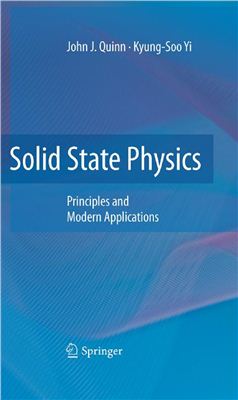Springer, Berlin, 2009, 536 pages
Uncorrected Proof
Intended for a two semester advanced undergraduate or graduate course in Solid State Physics, this treatment offers mode coverage of the theory and related experiments, including the group theoretical approach to band structures, Moessbauer recoil free fraction, semi-classical electron theory, magnetoconductivity, electron self-energy and Landau theory of Fermi liquid, and both quantum and fractional quantum Hall effects. Integrated throughout are developments from the newest semiconductor devices, e.g. space charge layers, quantum wells and superlattices. The first half includes all material usually covered in the introductory course, but in greater depth than most introductory textbooks. The second half includes most of the important developments in solid-state researches of the past half century, addressing e.g. optical and electronic properties such as collective bulk and surface modes and spectral function of a quasiparticle, which is a basic concept for understanding LEED intensities, X ray fine structure spectroscopy and photoemission. So both the fundamental principles and most recent advances in solid state physics are explained in a class-tested tutorial style, with end-of-chapter exercises for review and reinforcement of key concepts and calculations.
Состоит из 2 частей, содержащих 16 глав:
Part I Basic Concepts in Solid-State Physics
Part II Advanced Topics in Solid-State Physics
Uncorrected Proof
Intended for a two semester advanced undergraduate or graduate course in Solid State Physics, this treatment offers mode coverage of the theory and related experiments, including the group theoretical approach to band structures, Moessbauer recoil free fraction, semi-classical electron theory, magnetoconductivity, electron self-energy and Landau theory of Fermi liquid, and both quantum and fractional quantum Hall effects. Integrated throughout are developments from the newest semiconductor devices, e.g. space charge layers, quantum wells and superlattices. The first half includes all material usually covered in the introductory course, but in greater depth than most introductory textbooks. The second half includes most of the important developments in solid-state researches of the past half century, addressing e.g. optical and electronic properties such as collective bulk and surface modes and spectral function of a quasiparticle, which is a basic concept for understanding LEED intensities, X ray fine structure spectroscopy and photoemission. So both the fundamental principles and most recent advances in solid state physics are explained in a class-tested tutorial style, with end-of-chapter exercises for review and reinforcement of key concepts and calculations.
Состоит из 2 частей, содержащих 16 глав:
Part I Basic Concepts in Solid-State Physics
Part II Advanced Topics in Solid-State Physics

